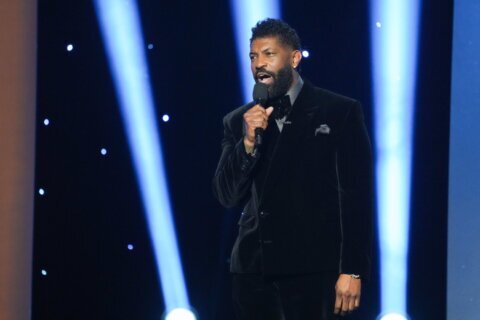Listen to the full conversation on our podcast “Beyond the Fame.”
After nearly two years of a devastating pandemic, you have to laugh to keep from crying.
Comedian Paula Poundstone finds the humor at The Birchmere from Friday to Sunday.
“I’m counting the minutes; I love The Birchmere,” Poundstone told WTOP. “I mostly work theaters, there’s like four clubs I work in the country and The Birchmere is one of them. … There’s something about just being in The Birchmere, I feel like I’m standing among the notes of the musicians who have been there. … The audience is so much fun.”
She says the D.C. audience is always smart, cultured and ready to laugh.
“I do the time-honored, ‘Where are you from? What do you do for a living?’ They’ll say, ‘I’m a social worker, I’m a teacher, I’m a plumber,’ but I know they’re all CIA,” Poundstone said.
As such, you can bet Beltway politics will make their way into the routine.
“I am not a political expert,” Poundstone said. “I talk about what I take in as a voter in trying to make sense of it. Of course, that’s harder and harder to do as time goes on. I’m not certain that Putin hasn’t just plain put something in our water. … I feel like we’ve gone insane. Not everybody, but lots, and those who have not yet gone insane are about to.”
She urges guests to be vaccinated and to wear masks during the show.
“No. 1, I love them and I don’t want anybody to die, and No. 2, it just doesn’t make sense as a business model to kill your audience,” Poundstone said. “Sometimes people think, ‘Ughh, it’s going to be hard to wear a mask through a whole show.’ It really isn’t. You forget about it after a while. It’s so much more comfortable than a ventilator.”
Her job as a comedian is to pick apart the peculiarities of the pandemic.
“I wish when people were finished with their masks that they would just put them in the trash,” Poundstone said. “Have you noticed how many are in the street? … I had a great mask. It had Fauci on the front of it. One day, I realized it wasn’t in my pocket. I think I pulled my phone out and it dropped, so I perhaps have added one mask to the collection.”
She is tired of dodging discarded masks on the ground like landmines.
“Discarded masks are like the weird little plastic dental floss things that are all over the street,” Poundstone said. “What the hell is that? I don’t understand. Who’s flossing as they’re walking around, because eww, and why wouldn’t you throw it away after you used it? There’s a certain population of skilled, athletic flossers that are non-environmentalists.”
Perhaps the masks are like Hansel and Gretel breadcrumbs leading us somewhere.
“I think they go to hell and back,” Poundstone said.
All joking aside, she worries that humanity is becoming apathetic to the grief and suffering.
“We definitely are numb,” Poundstone said. “When you hear about a death … it seems like we don’t feel the same way. The numbers are still shocking. There are a lot of people who were mask wearers like Bill Maher, who say, ‘It’s over now, why is everyone still wearing masks?’ It’s not over! We just got so comfortable with the numbers like, ‘Oh yeah, that.'”
She worries about the long-term effects on our brains.
“The stress of it we’ve internalized to such a degree that we don’t even realize anymore,” Poundstone said. “My memory, which was never good, is totally shot now. … It used to be I didn’t know why I walked into a room, and now I don’t know what room I’m in. … My head feels like Putin’s snowglobe. I just constantly feel like somebody shook it up somehow.”
Even so, she trudges ahead like every American in our “new normal.”
“Remember how terrified everyone looked in the grocery store?” she said. “They put arrows in the aisles so every aisle was one way. … I had as hard a time with that as I do cities that have a bunch of one-ways. If I didn’t pick up rice in the rice aisle, I didn’t get rice! It would take me an hour to get back there! I couldn’t figure out how to navigate!”
Still, she refuses to do self-checkout because she misses human interaction.
“I refuse,” Poundstone said. “I’m not doing self-checkout, because the few seconds I’m standing there and I say to the clerk, ‘How you doing? Good to see you?’ And I say to the woman bagging my stuff, ‘Gosh, I like your hair like that,’ those few seconds of exchange are important. That is what makes us human beings — that and we all have podcasts.”
Listen to the full conversation on our podcast “Beyond the Fame.”







